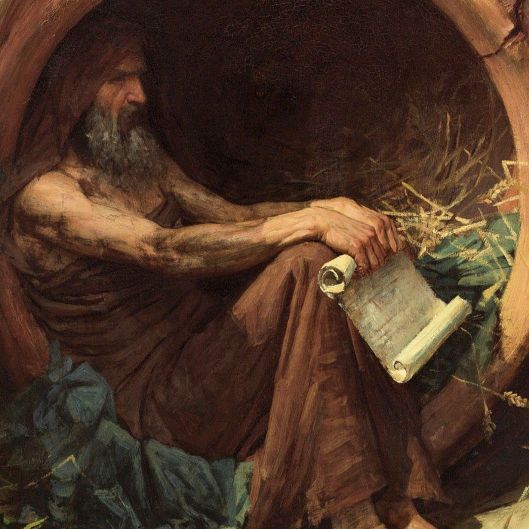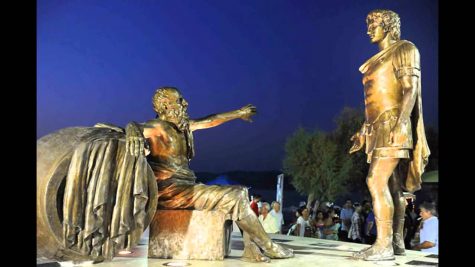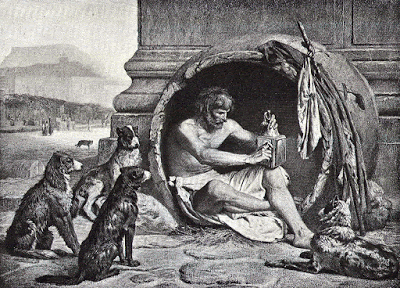Intelligence in a Barrel: The Life of Diogenes

From the depth of poverty comes philosophy
April 7, 2020
Background
Diogenes, a Greek philosopher who lived from 404 BC to 323 BC, is considered one of the founders of Cynicism. Over his years as a philosopher, he amassed a great following. This, however, didn’t come from his teachings but instead the absurdity of his actions, whether by purposely living in abject poverty or just casually urinating on people that insulted him. He was born in Sinope 404 BC and later exiled when he took to the practice of debasing a country’s currency, or the practice of lowering the intrinsic value of coins. Later he would move to Athens where he would criticize the social values and institutions he found to be corrupt. Throughout his time there he lived in poverty within his barrel in the marketplace.
Diogenes vs Plato
Plato, an Athenian philosopher, taught fellow philosophers in the Platonist School of Thought and was considered a pivotal figure in Ancient Greek history was to meet his opposite and enemy in Diogenes. The Barrel Dweller, however, found Plato’s teachings to be incorrect and often openly scrutinized Plato. One key example of this is when Plato defined man as a featherless biped. Diogenes, in response, plucked the feathers from a cock, brought it to Plato’s school, and said, ‘Here is Plato’s man.’ ”. After this incident “with broad flat nails” was added to Plato’s definition. It is said that Diogenes would also, casually, go into Plato’s institution and defecate on his desk, this was a reoccurring problem.

Diogenes’s Obscenity
Diogenes lived by his beliefs. He had disagreed and often disobeyed the “no eating” policy of the Athenian Marketplace. If anyone dared to question him why, he replied: “it is, in fact, appropriate to eat when you are hungry.”. He also was known to defecate in the theater and reasoned it by saying, “If only it were as easy to banish hunger by rubbing my belly.”. He also had no respect for the aristocracy. It is reported that he had once had a rather odd exchange with Alexander The Great. When the great conqueror witnessed him scrounging around in a trash pile that had human bones, Alexander the Great, hyped up on curiosity, asked what he was doing. Diogenes simply answered, “I am searching for the bones of your father but cannot distinguish them from those of his slave.” Alexander, taken by the impoverished philosopher, stated: “Were I not Alexander, I would like to be Diogenes.” When Alexander The Great offered the poor Diogenes anything he desired, Diogenes only responded by saying “you can move out of my sunlight”.

Fun Facts
When Diogenes first came to Athens he didn’t have anything but clothes and a bowl but upon seeing a homeless child drinking from a puddle with cupped hands he threw away the bowl. Another interesting fact is that since he lived on the streets he had a massive following….of dogs. He would give them the little food or water he had. This group of dogs followed him everywhere. He felt connected to these dogs, as they lived just like him, and he had a dear admiration for them. He also had a master named Antisthenes, who was ascetic and the way Diogenes got him to be his master was weird; he annoyed Antisthenes day and night by following the old man until he agreed to take him on as a student. At one point Antisthenes, tired of being followed around did the only thing a normal person would do and beat Diogenes with a stick after which he finally took him on as a student.
Conclusion
In conclusion, Diogenes was one of the greatest philosophers and of his time he believed in actions rather than words. This mentality helped him spread the word of cynicism all across Athens and made him a staple in Ancient Greek history, whether from his obscene actions to his surprising intellect.









